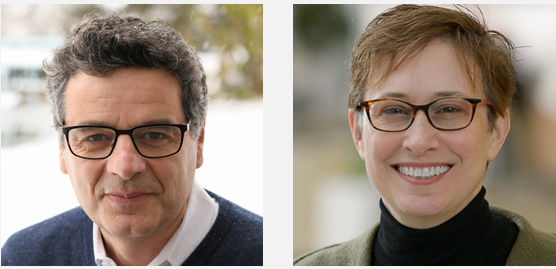PASC22: Computing and Data…. For All Humankind
Call for action: how can computing help solve some of the biggest challenges facing humanity today?
The PASC22 Organizing Team is pleased to announce that preparations are well underway for next year’s conference, which will be held from June 27 – 29, 2022, in Basel, Switzerland, and chaired by Prof. Petros Koumoutsakos (ETH Zurich, Switzerland / Harvard University, US) and by Dr. Lois Curfman McInnes (Argonne National Laboratory, US). PASC22 invites the HPC community to consider what our collective expertise in computational and data science can do to the benefit of all humankind.
The PASC Conference focuses on advances in methods, tools, algorithms, and applications to address challenges across all areas of computational science and engineering.
The special challenge this year is inspired by the 1989 documentary film “For All Mankind,” which celebrated the Apollo Program that brought the first person to the Moon. The key idea is that this mission was undertaken for all humankind. Consequently, the special challenge for PASC22 is Computing and Data … for all Humankind – emphasizing broad opportunities for computational and data science to impact our world.
We see ever-increasing levels of inequality in society. People experience inequality across various dimensions: financial, social, and access to health care and education. Because of this inequality, the global challenges gripping us today – climate change, the SARS-CoV-2 pandemic, supply chain issues, and so on – affect different communities in different ways. Inspired by current events, we have chosen three complementary themes of emphasis for PASC22:
- Computing for Planet Earth
- Data Science and Inequality
- Epidemiology and Public Health
These topics are all connected to one other: climate change affects public health; social inequality affects epidemiology, and so on.
PASC22, as an interdisciplinary conference, provides an ideal platform to discuss advances in these and other high-impact areas – thereby leveraging our collective expertise in computational and data science at the service of our global community.
Submissions open for PASC22
The PASC22 Organizing Team is pleased to announce that submissions for minisymposium, paper and poster contributions are now open. Submissions should be made through the submission portal.
As in previous years, the technical program is organized around eight scientific domains:
- Chemistry and Materials
- Life Sciences (incl. but not limited to biophysics, genomics, bioinformatics, systems biology, neuroscience and computational biology, …)
- Physics (incl. but not limited to astrophysics, cosmology, plasma modelling, QCD, …)
- Climate and Weather
- Solid Earth Dynamics
- Engineering (incl. but not limited to CFD, computational mechanics, computational engineering materials, turbulent flow, …)
- Computer Science and Applied Mathematics
- Emerging Application Domains (incl. but not limited to social sciences, finance, …)
Expressions of interest for minisymposia (by November 13, 2021)
The minisymposium submission for PASC22 is a two-stage process. The first stage is anexpression of interest, which includes a description of the proposed minisymposium (abstract) and suggestions for possible speakers who are experts in their field(s). The expressions of interest will be reviewed by the Minisymposia and Posters Program Committee. A selection of expressions of interest will be invited to submit a full proposal.
The review process will consider the relevance and timeliness of the proposal topic, as well as overall program balance.
The second stage, the full proposal, should include an extended abstract along with the names of possible speakers and presentation titles for four 30-minute presentation slots (typically, these slots are 25-minute talks with 5 minutes for questions). The minisymposium organizer is permitted to give one of the four presentations themself. If desired, the fourth 30-minute slot could be a panel discussion or open discussion forum. Please note that until final decisions are made, submissions should be considered as proposals, and no guarantees should be made by organizers to speakers named on their proposals.
The organizer of a minisymposium takes an “active chair” role in their session – that is, they should present a brief overview of the themes of the minisymposium and the state of the art, introduce the speakers and their topics, and facilitate a lively and interactive discussion amongst the speakers and audience throughout the session.
Guidelines for minisymposia and conference participation terms are available here.
Submission Deadlines
- 13 November 2021: Deadline for expressions of interest (NO EXTENSIONS!)
- 15 December 2021: Decision notifications (invitations to submit full proposals)
- 15 January 2022: Deadline for full submissions (NO EXTENSIONS!)
- 15 February 2022: Acceptance notifications
- 15 March 2022: Deadline for abstracts from presenting speakers
Minisymposium and Posters Program Committee
PASC22 is grateful to the following committee members for their support in shaping the conference program.
- Takayuki Aoki (Tokyo Institute of Technology, Japan)
- Marc Baaden (CNRS, France)
- Ramesh Balakrishnan (Argonne National Laboratory, US)
- Allison Baker (National Center for Atmospheric Research, US)
- Eleni Chatzi (ETH Zurich, Switzerland)
- Luigi del Debbio (University of Edinburgh, UK)
- Nicola Ferrier (Argonne National Laboratory, US)
- Mike Heroux (Sandia National Laboratories, US)
- Marina Krstic Marinkovic (ETH Zurich, Switzerland)
- Felix Kubler (University of Zurich, Switzerland)
- Margarete Jadamec (The State University of New York at Buffalo, US)
- (Xiaoye) Sherry Li (Lawrence Berkeley National Laboratory, US)
- Erik Lindahl (Stockholm University, Sweden)
- Nuria Lopez (Institute of Chemical Research of Catalonia (ICIQ), ES)
- Mathieu Luisier (ETH Zurich, Switzerland)
- Rajat Mittal (John Hopkins University, US)
- Robert Pincus (Columbia University, US)
- Matej Praprotnik (National Institute of Chemistry, Slovenia)
- Patrick Sanan (ETH Zurich, Switzerland)
- Ivo Sbalzarini (TU Dresden, Germany)
- Antonino Tumeo (Pacific Northwest National Laboratory, US)
- Wim van Rees (Massachusetts Institute of Technology, US)
- Julija Zavadlav (TU Munich, Germany)


